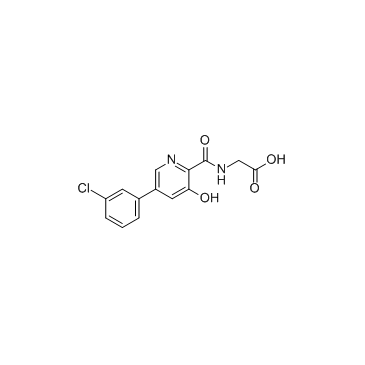1000025-07-9
| Name | vadadustat |
|---|---|
| Synonyms |
N-[5-(3-chlorophenyl)-3-hydroxypyridine-2-carbonyl]glycine
{[5-(3-chlorophenyl)-3-hydroxy-pyridine-2-carbonyl]-amino}-acetic acid {[5-(3-chloro-phenyl)-3-hydroxy-pyridine-2-carbonyl]-amino}-acetic acid {[5-(3-chlorophenyl)-3-hydroxypyridine-2-carbonyl]amino}-acetic acid {[5-(3-chlorophenyl)-3-hydroxypyridin-2-yl]carbonylamino}acetic acid {[5-(3-chlorophenyl)-3-hydroxypyridine-2-carbonyl]amino}acetic acid |
| Description | Vadadustat is a novel, titratable, oral hypoxia-inducible factor prolyl hydroxylase (HIF-PH) inhibitor in development for the treatment of anemia. |
|---|---|
| Related Catalog | |
| In Vitro | Vadadustat induces endogenous erythropoietin synthesis and enhances iron mobilization. Vadadustat is well-tolerated in healthy volunteers and patients with chronic kidney disease, where it increases reticulocytes, plasma EPO, and Hb levels in a dose-dependent manner. The increase in plasma EPO levels seen with vadadustat is comparable in magnitude to that occurring physiologically at moderate altitude and shows a normal diurnal pattern with a return to baseline levels prior to the next dose. Vadadustat improves iron homeostasis by decreasing hepcidin and increasing transferrin levels. once-daily oral administration of vadadustat, titrated to increase and maintain Hb in the target range, may provide multiple advantages over conventional ESAs[1]. Vadadustat is observed to have a half-life of approximately 4.5 hours. Overall, patients demonstrate an increase in Hb levels, from 9.91 g/dL at baseline to 10.54 g/dL by day 29. Ferritin levels decrease from 334.1 ng/mL at baseline to 271.7 ng/mL by day 29[2]. |
| References |
| Molecular Formula | C14H11ClN2O4 |
|---|---|
| Molecular Weight | 306.70100 |
| Exact Mass | 306.04100 |
| PSA | 99.52000 |
| LogP | 2.31290 |
| Storage condition | 2-8℃ |
